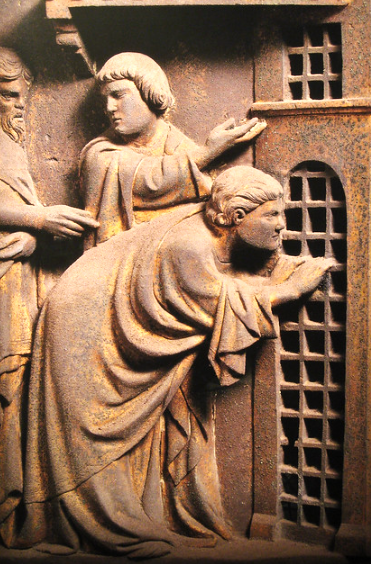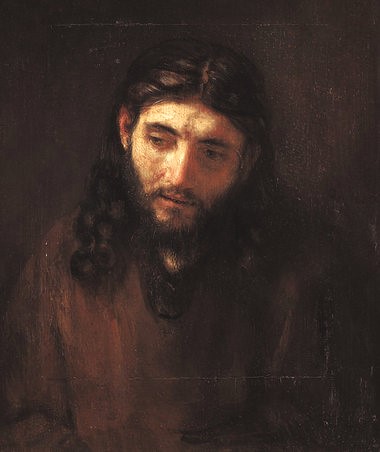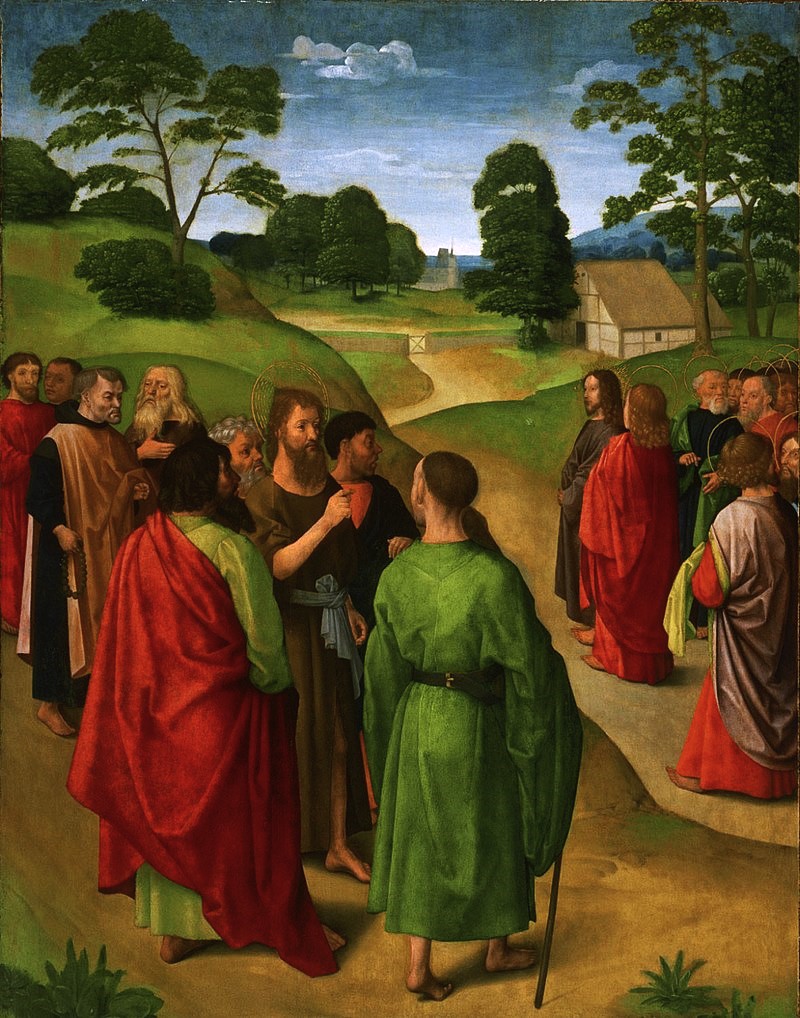
Andrea Pisano, Disciples Visit St John the Baptist, Baptistery of San Giavanni (detail), ca. 1330-36
Translation of the Holy Gospel According to Matthew
At that time, when John had heard in prison the works of Christ, sending two of his disciples, he said to Him: Art thou He that art to come, or look we for another? And Jesus, making answer, said to them: Go and relate to John what you have heard and seen. The blind see, the lame walk, the lepers are cleansed, the deaf hear, the dead rise again, the poor have the gospel preached to them: and blessed is he that shall not be scandalized in Me. And when they went their way, Jesus began to say to the multitudes concerning John: What went you out into the desert to see? A reed shaken with the wind? But what went you out to see? A man clothed in soft garments? Behold they that are clothed in soft garments are in the houses of kings. But what went you out to see? A prophet? Yea I tell you, and more than a prophet. For this is he of whom it is written: Behold, I send my Angel before Thy face, who shall prepare Thy way before Thee.
St. John Chrysostom, Exerpt from Homily 36
Why did St. John the Baptist send his disciples to ask if Jesus was the one who was to come?
John’s disciples were starting aside from Jesus, and this surely anyone may see, and they had always a jealous feeling towards Him. And it is plain, from what they said to their master: He that was with you, it is said, beyond Jordan, to whom you bore witness, behold, the same baptizes, and all men come unto Him. And again, There arose a question between John’s disciples and the Jews about purifying. And again they came unto Him, and said, Why do we and the Pharisees fast oft, but Your disciples fast not? For as yet they knew not who Christ was, but imagining Jesus to be a mere man, but John greater than after the manner of man, were vexed at seeing the former held in estimation, but the latter, as he had said, now ceasing. And this hindered them from coming unto Him, their jealousy quite blocking up the access. Now so long as John was with them, he was exhorting them continually and instructing them, and not even so did he persuade them; but when he was now on the point of dying, he uses the more diligence: fearing as he did lest he might leave a foundation for bad doctrine, and they continue broken off from Christ. For as he was diligent even at first to bring to Christ all that pertained to himself; so on his failing to persuade them, now towards his end he does but exert the more zeal.
Now if he had said, Go away unto Him, He is better than I, he would not have persuaded them, minded as they were not easily to be separated from him, but rather he would have been thought to say it out of modesty, and they would have been the more riveted to him; or if he had held his peace, then again nothing was gained. What then does he? He waits to hear from them that Christ is working miracles, and not even so does he admonish them, nor does he send all, but some two (whom he perhaps knew to be more teachable than the rest); that the inquiry might be made without suspicion, in order that from His acts they might learn the difference between Jesus and himself. And he says, Go, and say, Are you He that should come, or do we look for another?
But Christ knowing the purpose of John, did not say, I am He; for this would again have offended the hearers, although this was what it naturally followed for Him to say, but He leaves them to learn it from His acts. For it says, when these had come to Him, then He cured many. And yet what congruity was there, that being asked, Are you He?, He should say nothing to that, but should presently cure them that were sick; unless it had been His mind to establish this which I have mentioned? Because they of course would account the testimony of His deeds surer, and more above suspicion than that of His words.
Knowing therefore, as being God, the mind with which John had sent them, He straightway cured blind, lame, and many others; not to teach him (for how should He him that was convinced), but these that were doubting: and having healed them, He says, Go and show John again those things which you do hear and see; the blind receive their sight, and the lame walk, and the lepers are cleansed, and the deaf hear, and the dead are raised up, and the poor have the Gospel preached unto them. And he added, And blessed is he, whosoever shall not be offended in me; implying that He knows even their unuttered thoughts. For if He had said, I am He, both this would have offended them, as I have already said; and they would have thought, even if they had not spoken, much as the Jews said to Him, You bear record of Yourself. Wherefore He says not this Himself, but leaves them to learn all from the miracles, freeing what He taught from suspicion, and making it plainer. Wherefore also He covertly added His reproof of them. That is, because they were offended in Him, He by setting forth their case and leaving it to their own conscience alone, and by calling no witness of this His accusation, but only themselves that knew it all, did thus also draw them the more unto Himself, in saying, Blessed is he, whosoever shall not be offended in me. For indeed His secret meaning was of them when He said this.

Rembrandt, Head of Christ, ca. 1648 56.

